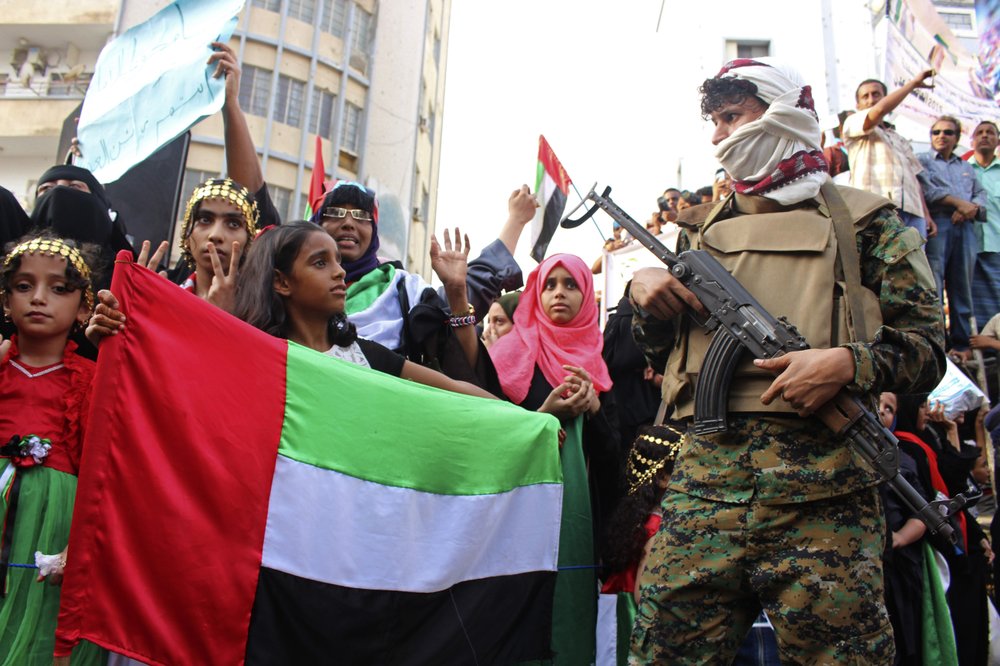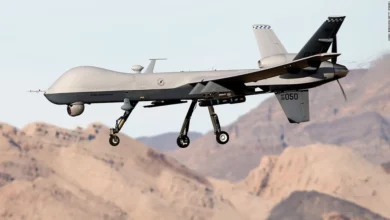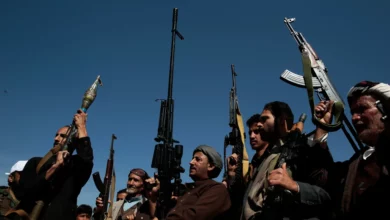Sanaa — Green, yellow, red and blue tents pepper the scene at Sanaa University’s “Square of Change.” Socialists, Islamists, liberals, men, women, children, judges, academics, artists and the unemployed share one space, eat together, chew qat together, and mull the future of their country. Some paint or draw new signs against Yemeni President Ali Abdallah Saleh — in power for more than 32 years — and his corrupt regime, while others watch Al-Jazeera to monitor the latest developments in the country. Some give speeches on the stage. Others administer awareness seminars to youth. Artists play music.
For many Yemenis the widespread protests sweeping the nation are changing their world.
“Welcome to the Land of Liberty!” reads the banners scattered throughout the area. “Welcome to the first mile of dignity!”
Started by the youth and university students after events in Tunisia and Egypt, the uprising in Yemen has now been underway for more than two months. Friday 25 March, dubbed the “Friday of Departure,” witnessed the largest protest turnout thus far. Hundreds of thousands of people demonstrated at Sanaa University, including many women, despite the fear of violence following the killing of 52 people the previous Friday. Protesters held red cards with irhal or “leave” written on them, symbolizing red cards in a football match.
Dozens of thousands of people on the “Friday of Departure” also went to Tahrir and Saba’een squares in support of Saleh. The president gave a speech in front of the large crowd, urging “stability and security in Yemen.” While he announced he would be ready to “peacefully transfer power to safe and capable hands,” he also said he would “stand firm in face of those wishing to remove us from power” while describing the protesters as “problem-makers, conspirators and drug dealers.”
For many, his speech sounded like a threat. Saleh has repeatedly said the protest movement could turn into a “civil war, a bloody one.” Addressing the crowd in front of him as “the army of the nation,” many people fear this could push Saleh supporters to fight against the university protesters. Accordingly, one hour after the end of the speech, some thugs tried to enter the “Square of Change,” but were prevented by the army who shot into the air to scare them.
The fear of chaos and instability in Yemen is also clearly shared by the United States government. Al-Qaeda in the Arabian Peninsula (AQAP) is a main concerns of the Obama administration, which sees Saleh as a key ally in the war against Islamic extremism. They worry that if the Yemeni president leaves, it could be an opportunity for AQAP to seize more power and influence.
The country’s youth, however, do not see the situation in the same light. For many, the departure of Saleh could be a solution.
“Saleh used Al-Qaeda to blackmail the West to get a lot of money,” said member of the General Union of Yemeni Youth Revolution (GUYYR) Kais Ahmed. “If he leaves, Al-Qaeda would lose support and the few people helping them because of the regime would stop. Yemenis would also be able to fight them and prevent them to act. We are not Afghanistan!”
With an unemployment rate above 30 percent, Yemen’s youth, who represent almost half of the country’s population, are asking for more job opportunities and a better future. They feel that the regime is too corrupt to help them, and, they say, they have lost trust in President Saleh.
And the youth feel the world is ignoring them by only focusing on two blocs: opposition parties and the current government. In response, they decided to organize themselves and work together in order to become a strong third force that cannot be ignored. In recent days and weeks, they have drafted a transitional plan for the future of Yemen. The youth want to show they are also deeply concerned about the situation and are aware of the challenges they will have to face following Saleh’s departure. Members of the movement, they allege, do not aspire to seize leadership positions in the future, but demand participation in negotiations.
According to this plan — made by more than 33 different groups who worked together for the past three weeks — an Interim Presidential Council, comprised of five people including one from the military, would be created for a six-month transition period.
“This time will be used to organize presidential and parliamentarian elections, but none of the council’s members will be authorized to run for it,” said Amen Dabwan, leader of the Yemen Free Youth Coalition (YFYC). The people in the council will be chosen from all over the country, and recognized “for their experience, their morals and their honesty.”
An Interim National Council should also be set up to represent youth, national leaders and political forces, according to the draft. It will work on a new constitution for a civil state, based on democratic citizenship and equal rights, and an electoral system based on proportional representation. The role of the youth will be to make the new government accountable by monitoring their activities and safeguarding transparency.
The document also requests the immediate release of all political prisoners, and the prosecution of individuals in the past government “who were the symbols of corruption” and of those “who caused or incited the killings or injuries of peaceful protesters.”
Many doubted the capacity of the youth to organize themselves and are still sceptical about their expectations. Gabool al-Mutawakel, member of the group Al-Watan for All, explains how the movement grew to its current robust state.
“Things started with a small group of activists, who knew the youth, and were working with them for a long time,” al-Mutawakel. “They all had the idea of a network, and then it spread. We also received help from academics who joined us today.”
Many among the youth criticize the lack of coverage from the media about their activities.
“They don’t trust us, because people don’t see us. No international media is coming to see what we’re doing,” added GUYYR’s Kais Ahmed. “That’s why no one knows about our work. If people were talking with us, they would see that we are ready.”
But many within the ranks of the youth movement also fear some domestic forces could hijack their revolution. That sentiment is echoed by the US and some Western governments. Yemen’s youths, however, appear determined to not let that happen.
“We have a plan, and we will not leave until our requirements are fulfilled and until we know that our rights will be ensured,” said Gabool al-Mutawakel.
The youth know the transition to a transparent and representative government will be a difficult process but many, such as supervisor of the GUYYR Shafiq al-Shadady, are full of hope.
“Yemen is a wealthy country. If there is a better management with the new government, then situation will start improving step by step,”
Others contend the unrest on Sanaa’s streets is geared more toward improving the lives of future generations.
“This revolution is not for us,” people commonly say, “but for our children.”




